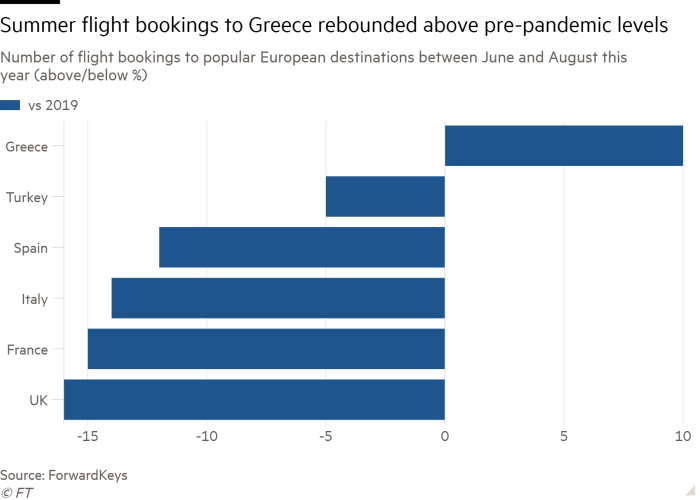Receive free German politics updates
We’ll send you a myFT Daily Digest email rounding up the latest German politics news every morning.
This article is an on-site version of our Europe Express newsletter. Sign up here to get the newsletter sent straight to your inbox every weekday and Saturday morning
Good morning. News to start: Tech giants Apple and Microsoft have argued that their respective iMessage service and Bing search engine are not popular enough to be affected by sweeping new EU legislation designed to curb the power of Big Tech that comes into force tomorrow.
Today, our Berlin correspondent ponders the spate of avoidable calamities befalling Germany’s political elite, while our climate correspondent explains why the European Commission’s spiralling jobs reshuffle is drawing resistance from lobby groups.
Self-inflicted wounds
Are Germany’s political leaders in a self-harm contest? It has been a rough few days for Olaf Scholz, who fell while jogging on Saturday and injured his face, forcing the German chancellor to wear an eye patch.
But it has been an even more bruising time for his political rival Markus Söder, the prime minister of Bavaria, who has come under heavy criticism over his handling of an antisemitism scandal just weeks before elections in Germany’s largest federal state, writes Laura Pitel.
Context: The scandal comes as Germany has seen a surge in support for the far right Alternative for Germany (AfD). Several European countries have seen rightwing populist parties grow stronger, with less than a year to go before European elections next June.
Söder, the leader of the conservative Christian Social Union, decided on Sunday that he would stick by his deputy, Hubert Aiwanger, even though he admitted possessing copies of a pamphlet that joked about Nazi concentration camps when he was a schoolboy.
The CSU leader said Aiwanger’s answers to his questions about the incident were “not all satisfactory”. But he also said that firing him would be “disproportionate” and made clear that he wanted to maintain his coalition with Aiwanger’s conservative Free Voters after the election on October 8, when the CSU is expected to finish in first place but without enough votes to govern alone.
Söder has been showered with opprobrium for his stance. Critics accused the CSU leader, who does little to hide his ambitions to one day occupy the chancellery in Berlin, of putting politics ahead of principles, and of undermining Germany’s postwar commitment to atoning for the Holocaust.
But a recent survey by the pollster Civey, commissioned by the newspaper Augsburger Allgemeine, offers some clues as to why Söder acted the way he did. Asked if Aiwanger should resign, 53 per cent of respondents said no. In conservative Bavaria, the result was even clearer, with 62 per cent saying it was wrong to ask him to step down.
Chart du jour: Hot destinations

Though travelling has become more expensive, tourists have been flocking to Europe again this summer. Flight bookings to Greece increased by 10 per cent compared with pre-pandemic levels despite scorching heat and wildfires.
Musical chairs
It’s a busy rentrée for the European Commission’s HR department as pre-election reshuffling of posts — and the respective backlash — has begun, writes Alice Hancock.
Context: As commissioners start looking for new jobs ahead of the vote next year, eyes in Brussels are on who will take over their posts. The redistribution of competition commissioner Margrethe Vestager’s powerful portfolios, when she steps down to run for president of the European Investment Bank (EIB), is among those most closely watched.
But she’s not the only one. International partnerships commissioner Jutta Urpilainen was asked to be a Finnish presidential candidate, and there’s a parliament hearing for the new Bulgarian commissioner, Iliana Ivanova, today.
To add to the fun, 10 of the largest climate NGOs in Brussels have written to commission president Ursula von der Leyen criticising the choice of Wopke Hoekstra as the EU’s new climate commissioner.
According to the letter, seen by the Financial Times, the NGOs were “highly sceptical” that the former Dutch foreign minister had “credentials and expertise to lead on this critical portfolio”.
The NGOs, including the WWF, Friends of the Earth and Greenpeace, said Hoekstra had a questionable record on climate, pointing to a previous job at the oil company Shell.
They also call out his decision to subsidise the airline KLM to the tune of €3.4bn during Covid and for “abandoning” The Hague’s objectives to reduce nitrogen emissions.
Hoekstra, who will be quizzed by the parliament’s environment committee this month, will be responsible for marshalling discussions over the EU’s 2040 climate target and representing the bloc at the COP28 climate summit in Dubai. “He needs to prove he is right,” Pascal Canfin, who chairs the environment committee, told the FT.
Von der Leyen has previously said his experience in government would be “a strong asset”. Hoekstra’s spokesperson did not respond to a request for comment.
What to watch today
-
European Commission president Ursula von der Leyen participates in the Africa Climate Summit in Nairobi, Kenya.
-
EU development ministers meet in Cádiz, Spain.
Now read these
Are you enjoying Europe Express? Sign up here to have it delivered straight to your inbox every workday at 7am CET and on Saturdays at noon CET. Do tell us what you think, we love to hear from you: europe.express@ft.com. Keep up with the latest European stories @FT Europe


Leave a Reply